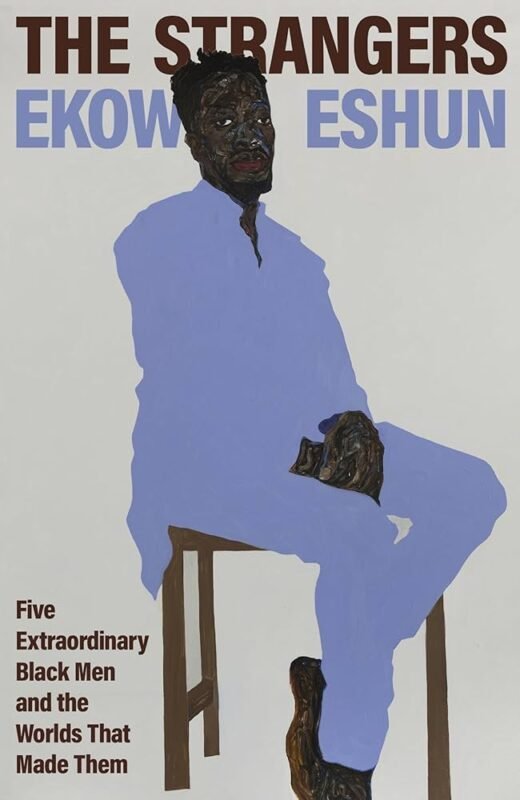What We’re Reading #2: Autumn 2024
For the second instalment of What We’re Reading the focus sharpens on both the urgency of our deepening political crises and the symbolic power of messianic imagery. Thomas King spotlights Yanis Varoufakis’ ongoing analysis of big tech, insights into the current U.S. election campaigns courtesy of David Levi Strauss, an eagerly anticipated book from Ekow Eshun that offers a form of literary portraiture of five black men, and more, presenting an overview of recent reflections at the intersection of politics, technology, and visual culture.
Thomas King | Resource | 12 Sep 2024
Yanis Varoufakis, Technofeudalism: What Killed Capitalism Penguin Books, June 2024
In Technofeudalism: What Killed Capitalism, popular economist and ex-Greek finance minister Yanis Varoufakis details the ascendancy of big tech oligarchs to the status of modern feudal overlords. He argues that the traditional capitalist engine – ‘private profit fuelled by central bank money’ – has been supplanted. In its stead, digital fiefdoms orchestrated by tech platforms extract value and ‘cloud capital’ from the masses, the purpose of which is to ‘train us, to train it, to train us’ while consolidating power within a diminutive oligarchy. Taking the form of a letter addressed to his recently deceased father, Varoufakis charts the evolution of capitalism from the 1960s into the present era. Here, Varoufakis contends that capitalism’s unchecked triumph has led to its latest grotesque mutation.
Varoufakis argues that the likes of Amazon and Facebook embody a new techno-order where digital platforms with a single algorithm dictates what is sold, who sees it, and how much ‘cloud rent’ is siphoned from vassal (or traditional) capitalists. Economic power is then seen to be shifting from traditional markets to digital spheres of operation controlled by small groups of unimaginably wealthy and powerful individuals. Within this hierarchy, vassal capitalists are squeezed by platform overlords, cloud proletarians (Amazon warehouse workers) are surveilled and managed by algorithms, and cloud serfs – everyday users – unwittingly contribute free labour, enhancing big tech’s capital stock. As wealth extraction has moved beyond traditional profit to a more insidious form of rent, Varoufakis describes the masses as ‘unpaid producers, toiling the landlords’ digital estates,’ much like feudal peasants who viewed their labour as integral to their identity. He warns that while today’s tech barons ‘treat their users however they like’ and are seemingly impervious to resistance, a ‘cloud rebellion’ offers hope. Varoufakis insists that ‘unless we band together, we shall never civilise or socialise cloud capital,’ nor will we reclaim our autonomy from its pervasive control.
‘This Is Not Just an Image’ | David Levi Strauss for The Brooklyn Rail, July 2024
‘Dying to make an image?’: this is the question David Levi Strauss, writer, poet, cultural critic asks of America’s deepening political crisis in a series of dispatches published in The Brooklyn Rail. Across numerous instalments Strauss delves into the polarising campaign period, refining his concept of ‘iconopolitics’ – where words and images become disconnected from reality. His analysis begins with the recent assassination attempt on Donald Trump, which despite its apparent failure, baptised him ‘in blood and in the image’ and arrived at an opportune moment to reinforce his messianic image – further amplified at the Republican National Convention shortly thereafter. Strauss’s inquiry has since extended to Trump’s choice of J.D Vance as his running mate – ‘an absolutely malleable subservient Vice President’ – and to Joe Biden’s passing of the torch to Kamala Harris, where ‘the old feeble man in the race is now Donald Trump.’
Although his 2020 book, Co-Illusion: Dispatches from the End of Communication, predates Trump’s iconic mug shot and the subsequent assassination attempt image, it crucially outlines the rise of Trump and Trumpism. Here, Strauss reveals the underlying decay in American exceptionalism and the evolving nature of how words and images are produced and perceived to make the current surreality possible. Strauss then delineates the latest iconic political image – more than just an image, as he contends – that has pierced the social psyche. The photograph of Trump that we all know, with his fist raised and face bloodied, is noted for its powerful, pyramid-like composition. Strauss concludes that this evocative frame distils a complex moment and, with its messianic overtones, will serve to reinforce belief, where both ‘images and politics are primarily about belief.’
‘How They Fell’ | Max Pinckers for De Standaard, July 2024
If Strauss argues that images rely on belief, Max Pinckers posits that ‘most iconic pictures are shrouded in controversy that alludes to their mythical powers.’ In his essay How They Fall, Pinckers critically examines the mythic significance of such images. Commissioned by Flemish newspaper De Standaard to write about a photograph that defines his life, Pinckers chose instead to focus on an image of death – or the illusion of it: Robert Capa’s The Falling Soldier, purportedly capturing the precise moment a Libertarian Youth soldier is shot during the Spanish Civil War. Pinckers challenges the authenticity of this image, which has been the subject of intense debate since the 1970s. He speculates on the photograph’s origins, writing that ‘most iconic photographs stand in for an event that they do not literally represent,’ suggesting that images are ‘experienced collectively and cannot claim a singular truth.’ Regarding The Falling Soldier, Pinckers notes that we often choose to believe the more compelling or dramatic narrative – that this image captures the split second when a man’s life ends. What does this reveal about our society? In a world increasingly mediated by social media, iconic images serve as ‘monuments’ to the histories that sustain them, encapsulating entire worlds in a single frame. These images, Pinckers suggests, are less about documenting reality and more about the widespread beliefs and master narratives we impose upon them.
Ekow Eshun, The Strangers: Five Extraordinary Black Men and the Worlds That Made Them, Penguin Books, September 2024
Writer, curator, and broadcaster Ekow Eshun presents The Stranger published by Penguin, an incisive study of five Black men – Ira Aldridge, Matthew Henson, Frantz Fanon, Malcolm X, and Justin Fashanu – all of whom grapple with the pervasive experience of exile and estrangement. Eshun approaches these figures, in his own words, not through the lens of ‘conventional biography’, but as a form of literary portraiture – intimate, impressionistic and acutely observed. Eshun’s objective is clear: “I wanted to give voice to the inner lives of these men. To explore what it feels like to be made Other, while also giving subjective lens to the ideas and dreams that sustained them.” His prose, both precise and evocative, renders these individuals not as mere subjects of historical scrutiny, but as complex persons navigating a world that relentlessly marginalises. By charting their trajectories within the wider framework of Black history and culture, Eshun reveals the intricate interplay of alienation, identity, and the unyielding quest for dignity. The Stranger is more than a historical account; it is a critical intervention that restores agency to its subjects, offering a profound meditation on the intricacies of belonging and the lasting impact of othering.
Ex-Machina, A24, Screenplay Book, MACK, July 2024
Ex-Machina is the first title in the Screenplay Collection by MACK and A24, ‘the first of its kind between a studio and a publishing house.’ Each Screenplay Book focuses on an individual film and includes the entire script as well as original essays, director-selected frames, behind-the-scenes content and other extras. This edition features Alex Garland’s celebrated sci-fi script, essays by queer theorist Jack Halberstam and AI expert Murray Shanahan, and concept art by Jock. Shanahan, a cognitive robotics expert who consulted on the film, warns of the dangers of creating human-like AI and questions whether we should craft beings ‘capable of both empathy and suffering.’ Whether we engineer AI from scratch or emulate the human brain, his cautionary message remains critically relevant a decade after the film’s release.
The film of course stars Domhnall Gleeson as Caleb, a programmer who wins a week at the secluded estate of tech CEO Nathan (Oscar Isaac), and explores ideas of artificial intelligence, consciousness and ethics. Caleb’s task is to determine whether Ava (Alicia Vikander), an advanced humanoid robot, possesses AI. Nathan’s creation of Ava is more than a scientific achievement; it asserts control over nature, positioning himself as a god-like figure. In a telling moment from the film, Nathan reveals to Caleb that his competitors thought search engines were “a map of what people were thinking. Actually, they were a map of how people were thinking. Impulse, response. Fluid, imperfect. Patterned, chaotic.” However, despite this warning, Ex Machina becomes concerned with Ava’s personal liberation and manipulation of the humans around her. She challenges perceptions of consciousness and autonomy as she becomes the ‘God’ of her own story – a true deus ex machina. While the book explores the layers of authorship behind the film, Garland’s script and the book as a whole stand as a complex, multifaceted work, engaging readers in a dialogue about reality, perception and control in the age of AI.♦
—
Thomas King is Editorial Assistant at 1000 Words and a student on BA (Hons) Culture, Criticism, Curation at Central Saint Martins, University of the Arts London.
Images:
1-Cover for Yanis Varoufakis, Technofeudalism: What Killed Capitalism (Penguin Books, 2024)
2-Republican presidential candidate former President Donald Trump is surrounded by U.S. Secret Service agents at a campaign rally, Saturday, July 13, 2024, in Butler, Pa. (AP Photo/Evan Vucci)
3-Robert Capa, The Falling Soldier, 1936. © International Center of Photography, New York / Magnum Photos
4-Cover for Ekow Eshun, The Strangers: Five Extraordinary Black Men and the Worlds That Made Them (Penguin Books, 2024)
5-Still from Ex-Machina
1000 Words favourites
• Renée Mussai on exhibitions as sites of dialogue, critique and activism
• Roxana Marcoci navigates curatorial practice in the digital age
• Tanvi Mishra reviews Felipe Romero Beltrán’s Dialect
• Discover London’s top five photography galleries
• Tim Clark in conversation with Hayward Gallery’s Ralph Rugoff on Hiroshi Sugimoto
• Academic rigour and essayistic freedom as told by Taous Dahmani
• Shana Lopes reviews Agnieszka Sosnowska’s För
• Valentina Abenavoli discusses photobooks and community
• Michael Grieve considers Ute Mahler and Werner Mahler’s posthumous collaboration with their late family member
• Elisa Medde on Taysir Batniji’s images of glitched video calls from Gaza





